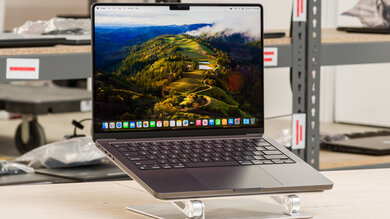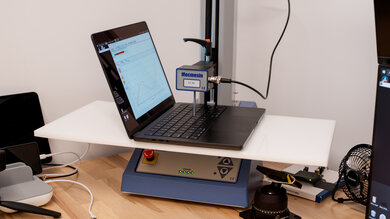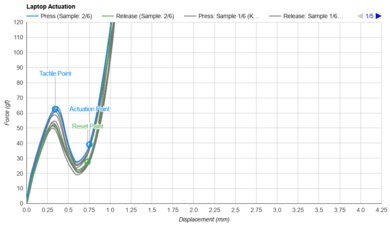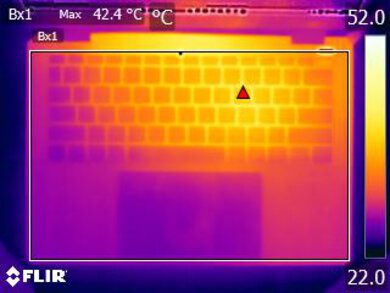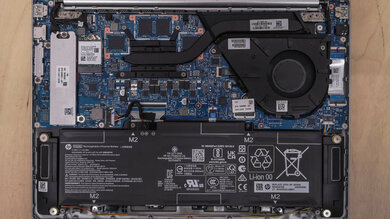
Whether you're an amateur photographer who likes to snap candid photos or a professional hired for big events, there are some key considerations when shopping for a photo editing laptop. First and foremost is the display. If you don't plan on using an external monitor, you'll need a display that can produce all the colors in the color space in which you work, whether it's sRGB or Adobe RGB. A laptop with a large, high-resolution screen is preferable, as it'll allow you to easily see the fine details in your pictures. You don't necessarily need a discreet graphics card, but some programs leverage the GPU to provide a smoother experience when manipulating images or running AI-powered denoising functions. Still, the CPU does the bulk of the processing. You'll also want to consider whether you need Thunderbolt 4 or USB4 support for fast file transfers and if you'll need to prioritize portability and battery life for working on the go.
We've bought and tested over 125 laptops. Below, you'll find our recommendations for the best laptops for photo editing you can buy. You can also see our recommendations for the best laptops, the best business laptops, and the best laptops for graphic design.
-
Best Laptop For Photo Editing
SchoolGamingMultimediaWorkstationBusinessBrightness8.8Reflections8.8Out-Of-The-Box Color Accuracy9.7Color Gamut9.5Cinebench R23 (CPU Rendering)9.9Battery Life (Web Browsing)15.5 hrsThe best laptop we've tested for photo editing is the Apple MacBook Pro 14 (M3, 2023). This premium workstation provides an amazing user experience. Its Mini LED display is sharp and superbly calibrated out of the box, so you can get right to work without further calibration. It's also bright enough to combat glare in well-lit settings. The only downside is that it doesn't have full coverage of the Adobe RGB color space, as it can't reproduce the highly saturated greens. Regarding hardware, there's more than enough processing power to handle complex photo editing tasks. Depending on your budget and needs, you can configure it with a base M3, M3 Pro, or M3 Max SoC. Apple's M3 chips are even more power-efficient than their M2 predecessors, resulting in an even longer battery life of 14 to 15 hours of light use.
The HP OMEN Transcend 14 (2024) is our top pick for Windows users. Although it carries the OMEN name, this model has a relatively tame design, so it's fine for a professional work environment. One advantage of this model is its OLED display, which offers near-full Adobe RGB coverage. However, it's not as color-accurate out of the box as it oversaturates colors. Its Intel Core Ultra CPUs and NVIDIA 40-series discrete GPUs make it superb for intensive tasks. The Core Ultra CPUs sport an NPU (Neural Processing Unit), which some photo editing apps leverage for tasks like image generation or denoising. There's also a wide port selection, including two USB/Thunderbolt 4s and an HDMI 2.1; there's no SD card reader like the MacBook Pro, though. The biggest downside is its short battery life of around six to seven hours of light use.
-
Best Upper Mid-Range Laptop For Photo Editing
SchoolGamingMultimediaWorkstationBusinessBrightness7.8Reflections7.3Out-Of-The-Box Color Accuracy6.9Color Gamut9.7Cinebench R23 (CPU Rendering)9.5Battery Life (Web Browsing)11.0 hrsIf you don't need a discrete GPU for your workflow, get the HP Spectre x360 14 (2024) instead. Like the HP OMEN Transcend 14 (2024) above, this premium 2-in-1 convertible has a beautiful OLED display with near-full Adobe RGB coverage. The display supports pen input if you prefer working with a stylus; depending on your region, the pen may not come in the box. You can get it with the same Intel Meteor Lake CPUs (up to a Core Ultra 7) and up to 32GB of RAM and 2TB of storage. It has an excellent haptic touchpad, an outstanding 4k webcam, and a decent port selection with two Thunderbolt 4 ports. The battery lasts around 11 hours of light use, which is impressive for a Windows laptop. One thing to know: the OLED display flickers, so it may cause eye strain if you're sensitive to display flicker. The base model starts at $1450 USD (MSRP); you can get it directly from HP if you have trouble finding it elsewhere.
For Mac users, we recommend the Apple MacBook Air 15 (2024). This premium ultraportable sports a large, bright 15-inch display that lets you work more comfortably, and its 2.8k resolution looks incredibly sharp. However, it's an IPS panel, so the contrast ratio is worse than the picks above, and it doesn't have full Adobe RGB coverage (it's missing highly saturated greens). Still, it offers a fantastic user experience; it has a sturdy build, all-day battery life, and a fast M3 SoC that can easily handle photo editing tasks. Its battery life lasts almost 13 hours of light use—better than either HP laptop. Plus, this is a fanless device, so you don't have to worry about loud fan noise distracting you from your work. Port selection is its biggest weakness, as it only has two USB-C ports. The M3 model supports two external displays, which is an improvement over its M2 predecessor, but it can only do so with the lid closed.
-
Best Mid-Range Laptop For Photo Editing
SchoolGamingMultimediaWorkstationBusinessBrightness8.4Reflections7.6Out-Of-The-Box Color Accuracy6.2Color Gamut8.8Cinebench R23 (CPU Rendering)9.7Battery Life (Web Browsing)10.0 hrsOur mid-range pick is the HP Pavilion Aero 13 (2024), a 13-inch ultraportable. One significant trade-off at this price point is the display. While the FHD+ and QHD+ IPS displays get quite bright and offer full sRGB coverage, they fall short in Adobe RGB coverage; their color accuracy is also mediocre out-of-the-box. There's plenty to love about this laptop, though. It's configurable with AMD's Zen 4 Ryzen CPUs that can handle moderately demanding workloads. You also get a 1440p webcam with facial recognition support for quick logins and a wide port selection with four USBs and a true HDMI 2.1 port.
Battery life is great at around 10 hours of light use—you can charge the laptop via USB-C, so you won't have to deal with a proprietary charger. Unfortunately, the build quality is a pretty significant step down from our picks above and the biggest compromise for this model's more budget-friendly price. Its aluminum and plastic chassis flexes a fair amount, and the device as a whole feels hollow and cheap. The finish scratches easily from everyday use, which is unfortunate as its design prioritizes portability. Another minor complaint is the touchpad; it's plastic and doesn't track continuous inputs all that well, like when dragging and dropping items across a long distance.
-
Best Budget Laptop For Photo Editing
SchoolGamingMultimediaWorkstationBusinessBrightness7.9Reflections6.7Out-Of-The-Box Color Accuracy7.3Color Gamut9.6Cinebench R23 (CPU Rendering)9.7Battery Life (Web Browsing)6.5 hrsOur budget pick is the Acer Swift 3 14 (2022). While this 14-inch model was originally a more expensive offering, it's a couple of years old, so some variants are available at a wallet-friendly price. As a result, you get some features that you normally only see on higher-end models, like a 2.8k OLED display with full coverage of the sRGB and Adobe RGB color spaces. You even get two USB-C ports with Thunderbolt 4 support. However, not every model fits within the budget price point, and those that do come with some important compromises.
On cheaper variants, you only get 8GB of soldered RAM, and you can't add more; this can quickly become limiting when working with multiple apps simultaneously. 16GB models are available if you need more RAM, but they can be harder to find and cost more. This laptop also comes with the three-generation old Intel Core i5-12500H. It's still a capable CPU that can handle demanding tasks, but unlike Intel's newer offerings, there's no NPU to help with AI-accelerated tasks. Battery life is also mediocre, lasting just over 6 hours for light use. You'll need to keep the charger close by for this one if you plan to use it out and about.
Notable Mentions
- Apple MacBook Pro 16 (M3, 2023): The Apple MacBook Pro 16 (M3, 2023) is a great alternative to the Apple MacBook Pro 14 (M3, 2023) if you need more screen space. The trade-off is that it isn't as portable and costs more. See our review
- ASUS Zenbook 14 OLED (2024): If 2-in-1 convertibles aren't for you, get the ASUS Zenbook 14 OLED (2024) instead of the HP Spectre x360 14 (2024). It's a traditional clamshell laptop with a similar OLED display and the same Intel Meteor Lake CPUs. However, it throttles much more under load, and its battery life is shorter at around eight hours of light use. Also, there have been many complaints regarding ASUS warranty repairs, so it may be hard to get the laptop fixed if you encounter issues. See our review
- ASUS Zenbook 14 Flip OLED (2023): The ASUS Zenbook 14 Flip OLED (2023) is cheaper than the HP Spectre x360 14 (2024). It's also a 2-in-1 convertible with pen input support, but it's only available with older Intel 13th-Gen CPUs (with no NPU), and it throttles a lot under load. Additionally, its battery lasts only around eight hours of light use. See our review
- ASUS ROG Zephyrus G14 (2024): If you want a laptop with similar hardware to the HP OMEN Transcend 14 (2024) that can also double as a gaming laptop, consider the ASUS ROG Zephyrus G14 (2024). It features better build quality, longer battery life, and superior reflection handling. However, the display flickers at 120Hz, which might be more bothersome to some people than the HP's 480Hz flicker. See our review
- Lenovo Yoga 6 13 (2023): The Lenovo Yoga 6 13 (2023) is cheaper than the HP Pavilion Aero 13 (2024). It has a sturdier build and a better touchpad; however, its display doesn't get as bright, and its webcam is significantly worse. It also doesn't perform as well because it uses slower AMD Zen 3-based CPUs, whereas the HP laptop uses newer Zen 4 processors. See our review
Recent Updates
-
Aug 06, 2024: We've updated the article for clarity and, due to availability, replaced the Lenovo Yoga 7i 16 (2023) with the HP Pavilion Aero 13 (2024) and the Acer Swift 3 14 (2020) with the Acer Swift 3 14 (2022).
-
May 14, 2024: Replaced the Dell XPS 15 (2023) with the Apple MacBook Pro 14 (M3, 2023) because the Dell is no longer available. Replaced the ASUS Zenbook 14 OLED (2024) with the HP Spectre x360 14 (2024) because the HP has a much longer battery life and provides a better user experience overall. Added the ASUS Zenbook 14 OLED (2024) as a Notable Mention.
-
Apr 08, 2024: Small text edits for clarity. Added the ASUS Zenbook 14 Flip OLED (2023) and the ASUS TUF Gaming A16 Advantage Edition (2023) as Notable Mentions.
-
Mar 07, 2024: Replaced the ASUS Zenbook 14 Flip OLED (2023) with the ASUS Zenbook 14 OLED (2023), as the latter has better performance and is easier to find. Replaced the Apple MacBook Air 13 (M1, 2020) with the Lenovo Yoga 7i 16 (2023) because the M1 MacBook Air was discontinued. Removed the Lenovo Slim Pro 7 14 (2023) as a Notable Mention because it's discontinued and hard to find.
-
Feb 07, 2024: Minor text changes to add the M3 Apple MacBook Pro 14 and 16 as alternatives to the Dell XPS 15 (2023).
All Reviews
Our recommendations above are what we think are currently the best laptops for photography to buy. We factor in the price (a cheaper laptop wins over a pricier one if the difference isn't worth it), feedback from our visitors, and availability (no laptops that are difficult to find or almost out of stock everywhere).
If you prefer to make your own decision, here's the list of all of our laptop reviews, sorted by price from low to high. Most laptops are available in various configurations, and the table only shows the results of the model we tested, so it's best to see the full review for information about other variants.
